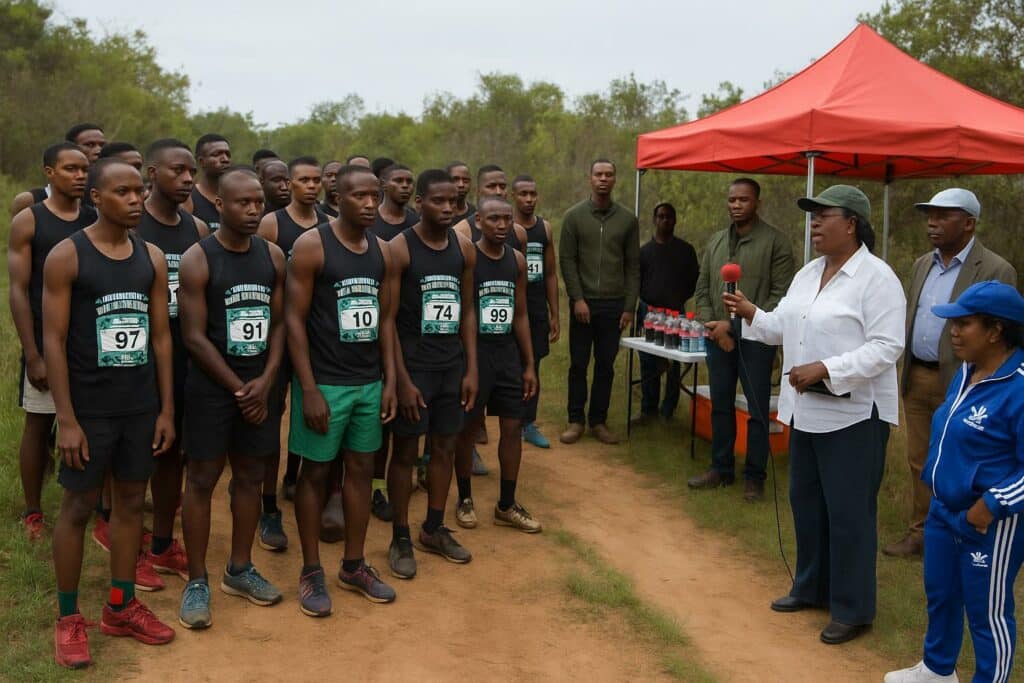Forest Track, Global Ambition
The still-misty canopy of Odzala-Kokoua National Park echoed on 11 October with the rhythmic cadence of 120 distance runners, a record turnout for the Odzala Marathon’s sophomore year. Three distances—42 km, 21 km and 10 km—took off at staggered starts, each flagged away by Minister of Cultural and Tourism Industries Lydie Pongault. From the gun to the finish tape in Mbomo village, the contest unfolded less as a race against the clock than as a manifesto for Congo-Brazzaville’s emerging brand of eco-sports tourism.
Victory over the classic 42 km went to Djibil Agnouka of African Parks in 3 h 49, while Fred Itadi (1 h 37) and Joseph Obanga (42 min) dominated the half-marathon and 10 km respectively. Yet podium statistics told only part of the story; every finisher received a medal personally bestowed by the minister, underscoring official endorsement of an event staged in one of the continent’s oldest rainforests.
Conservation Through Competition
Running amidst colobus monkeys, forest elephants and the emblematic western lowland gorilla turns each kilometre into an immersion course on biodiversity. “If we want to keep drawing breath beneath this canopy, we must protect it,” argued Elza Gillman, chief executive of Kamba, the lodge operator that co-created the race with African Parks (African Parks; Odzala-Kokoua National Park data). Her rationale aligns with the park’s management model, which entrusts daily conservation work to a public-private partnership between the Congolese Government and the non-profit African Parks.
Unlike urban road races, the Odzala route snakes along laterite paths and elephant corridors, obliging runners to yield as much to nature as to pace strategy. The organisers’ wager is that the sensory shock of seeing fresh primate tracks or hearing a hornbill overhead imprints a stronger conservation ethic on participants than any classroom lecture could. The marathon thus functions as both athletic showcase and extension of the park’s environmental outreach, which already includes community ecoguide programmes and anti-poaching patrols funded by gate fees (Ministry of Tourism press release, 12 Oct 2023).
State and Corporate Backing: A New Financial Horizon
This year’s edition introduced multiple private sponsors—from regional telecom operators to sustainable beverage brands—whose logos punctuated the forest clearing that served as finish area. Their arrival, coupled with ministerial presence, signals a maturing financial architecture for the race. “We shall make the Odzala Marathon a permanent fixture on our national tourism calendar,” Minister Pongault declared, promising regulatory facilitation and promotional support aimed at attracting foreign elites and adventure travellers.
Congo-Brazzaville’s portfolio of distance events is otherwise limited to the Brazzaville Semi-Marathon run each 14 August. By institutionalising a second flagship race, the state diversifies a sports offering still largely centred on football, while showcasing the Congo Basin’s ecological capital. Such positioning dovetails with the national strategy adopted in 2022 to raise tourism’s GDP contribution from 3 % to 10 % by 2030 (Ministry of Planning data).
Community Vibrancy and Youth Engagement
Mbomo village transformed the race weekend into a festival, staging children’s ‘Olympic Games’ that ranged from relay races to tug-of-war. The initiative reflects a conscious effort to democratise the benefits of an event that could otherwise feel remote from local livelihoods. By allocating part of sponsorship revenue to school supplies and healthcare posts, organisers aim to entrench community buy-in—a prerequisite for the long-term security of both sporting and conservation goals.
Parents interviewed on site expressed pride in seeing their children run alongside athletes from Brazzaville and abroad, fostering what one elder called “a new dialogue between village and forest.” Such social dividends reinforce the park’s earlier community-development schemes, including craft markets and ranger recruitment.
À retenir
The Odzala Marathon’s second edition doubled its field, attracted fresh corporate funding and secured a pledge of annual scheduling from the Ministry of Cultural and Tourism Industries. By merging endurance sport with ecological storytelling, the race exemplifies Congo-Brazzaville’s aspiration to harness its vast rainforest as both carbon sink and economic lever.
Legal and Economic Perspective
Under Congolese law, sporting events held within protected areas require dual permitting from the Ministry of Sports and the Ministry of Forest Economy to ensure compliance with conservation statutes. Organisers report that environmental impact assessments were conducted in accordance with Decree 2018-28 on Ecological Events, limiting runner traffic to existing trails and banning single-use plastics. On the economic front, preliminary figures released by Kamba indicate direct local spending of 48 million CFA francs during race week, a modest but promising injection that strengthens the case for sustained public-private partnership financing.
Toward an Equatorial Major
Looking ahead, Gillman sketches a roadmap that borrows from Berlin or New York: certified routes, satellite timing, and prize purses calibrated to lure elite marathoners. Realisation of that vision will hinge on improved access. Presently, runners endure an eight-hour overland journey from Brazzaville to the park; feasibility studies for a regional airstrip are under review, subject to environmental safeguards (African Parks).
For now, the Odzala Marathon remains a compelling paradox: at once intimate and globally aspirational, rugged yet meticulously organised. Each stride cuts through red soil but also through preconceptions about Congo-Brazzaville, projecting an image of a nation where competitive spirit and conservation ethic run side by side.

